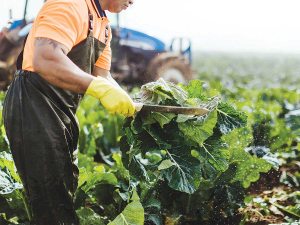Labour shortages easing
Labour shortages in the meat processing sector are easing with more migrant workers joining the ranks.
 The ANZ Agri Focus Report says the horticultural sector is heading for trouble due to labour shortages
The ANZ Agri Focus Report says the horticultural sector is heading for trouble due to labour shortages
Overall the NZ economy has performed more strongly than anticipated, according to the ANZ Agri Focus Report.
It says consumer spending has helped keep the economy afloat. The report also notes that global shipping costs may have peaked, but it could be another 18 months before these stabilise. It also warns about escalating compliance costs both in NZ and globally, which will impact the sector.
The report says the horticultural sector is heading for trouble due to labour shortages. It says the situation will be worse this season than last season; the lack of backpackers, who normally make up 25% of the labour force in the sector, is a particular problem. It points to Zespri’s claims that it will be 6500 workers short – 2500 more than last year.
The report also signals another concern about the inexperience of new workers and says labour shortages may also impact on the quality of the fruit picked.
Last season it was estimated that only 80% of NZ’s apple crop was picked and there are hints that it could be a bumper year for fruit of all kinds.
The sheep and beef sector outlook is promising, with all the usual caveats such as labour shortages in some processing plants. It says the lamb kill has been slower than normal, due to poor pasture growing conditions which hurt feed quality, hence fewer lambs were ready for the works. Despite this, it says international prices for lamb are expected to remain firm due to supply issues and high demand from China. ANZ is predicting record average farmgate prices for lamb.
International beef prices remain firm, says the report, with the US price for beef close to the high levels of 2019 when both China and the US were bidding for our product. It notes farmgate prices in NZ are high, partly due to limited throughput at the works.
As for the deer sector, ANZ Agri Focus says returns at the farmgate were not as low as expected and that demand for frozen product remains robust in our major export markets.
Prime Minister Christopher Luxon says withdrawing from the Paris Agreement on climate change would be “a really dumb move”.
The University of Waikato has broken ground on its new medical school building.
Undoubtedly the doyen of rural culture, always with a wry smile, our favourite ginger ninja, Te Radar, in conjunction with his wife Ruth Spencer, has recently released an enchanting, yet educational read centred around rural New Zealand in one hundred objects.
Farmers are being urged to keep on top of measures to control Cysticerus ovis - or sheep measles - following a spike in infection rates.
For more than 50 years, Waireka Research Station at New Plymouth has been a hub for globally important trials of fungicides, insecticides and herbicides, carried out on 16ha of orderly flat plots hedged for protection against the strong winds that sweep in from New Zealand’s west coast.
There's a special sort of energy at the East Coast Farming Expo, especially when it comes to youth.